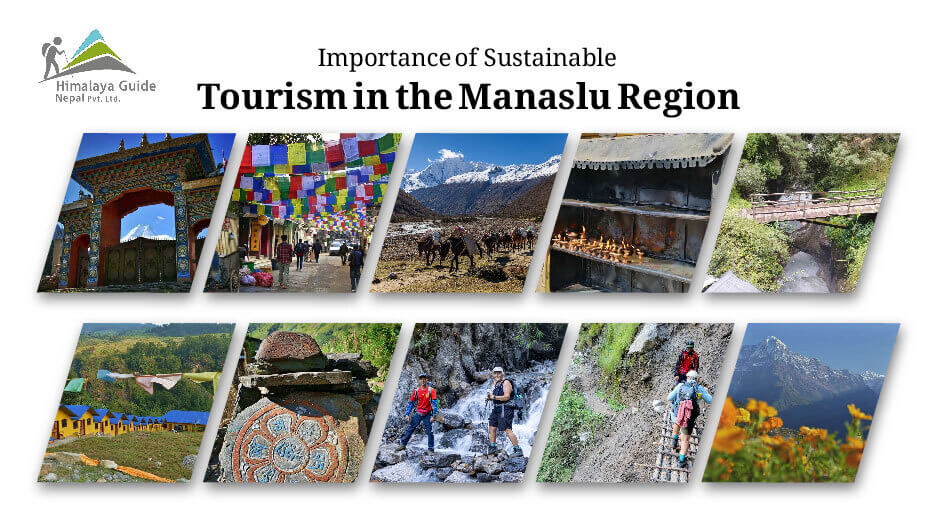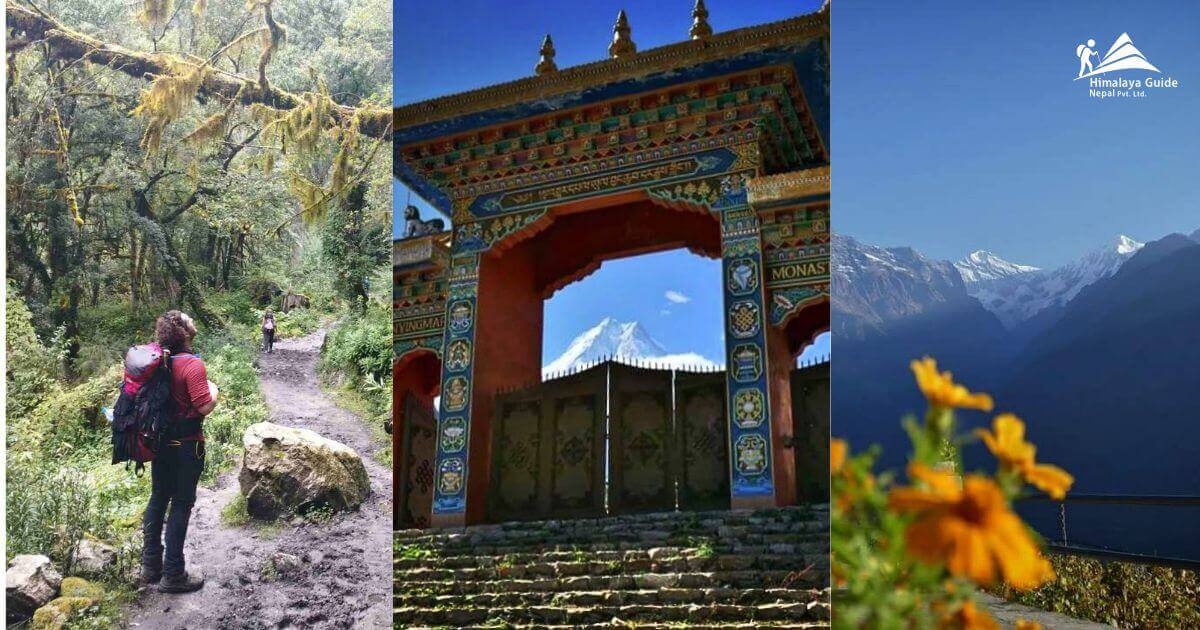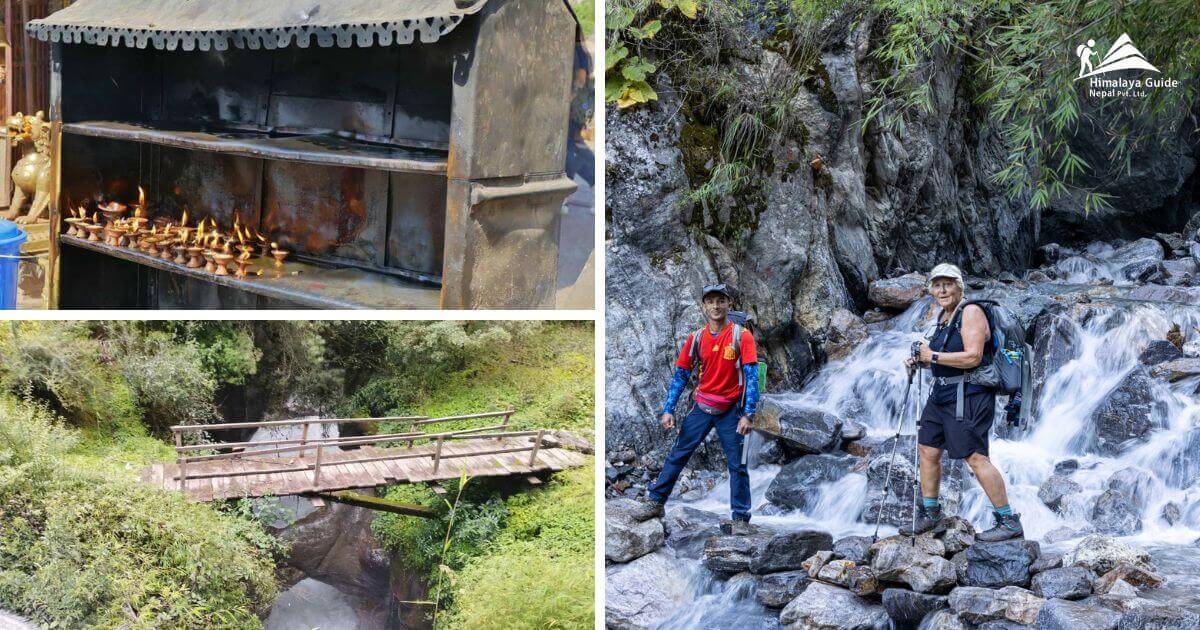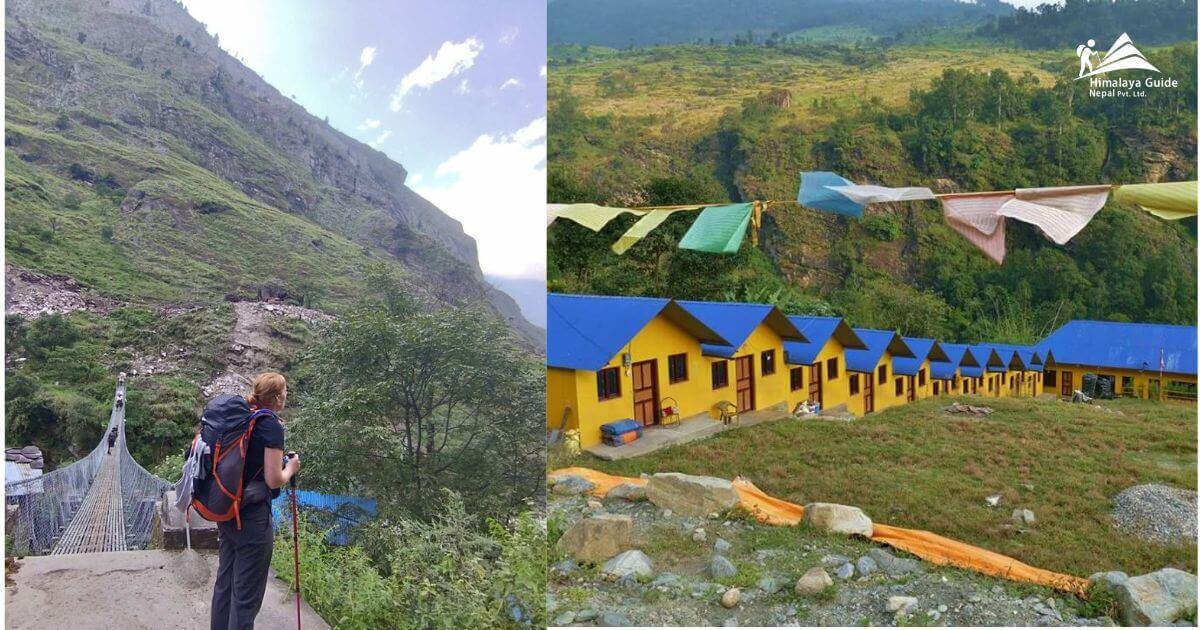Importance of Sustainable Tourism In The Manaslu Region

16 Apr 2023 Chandra Gurung
Sustainable tourism, also called responsible tourism or ecotourism, aims to maximize the positive effects of tourism while minimizing its adverse effects on the environment, the economy, and local populations. The importance of sustainable tourism in the Manaslu Region lies in its ability to promote economic growth, social well-being, and environmental conservation while respecting and preserving the local culture and heritage.
Responsible resource management, preservation of the area’s natural and cultural history, consideration for the local populations and cultures, support for the growth of the local economy, and promotion of regional goods and services are just a few of the activities that go into ecotourism.
Ecotourism attempts to involve and empower local populations in tourism planning and decision-making processes to guarantee that tourism benefits are delivered fairly and equitably.
Sustainable Tourism
Sustainable tourism is based on sustainable development principles, which recognize the interconnection of environmental, social, and economic concerns. By supporting responsible tourism, we can support economic growth and development while protecting the natural and cultural resources that make tourism destinations appealing and unique.
Sustainable Tourism Principles
Sustainable tourism principles are protocols that inspire to encourage ecotourism activities. These principles are as follows:
- Respect for the environment
- Social and cultural sensitivity
- Economic viability
- Sustainable resource use
- Excellent tourism experiences

Respect For The Environment:
First, tourist operations should be carried out to minimize environmental damage and encourage natural resource conservation.
Social And Cultural Sensitivity:
Tourism should respect the host community’s cultural and social norms, promote local companies, and connect positively with the local population.
Economic Viability:
Tourist operations should contribute to the local community’s economic growth and development, promote fair and equitable benefit distribution, and support local employment possibilities.
Sustainable Resource Use:
Tourist activities should also encourage sustainable energy, water, and land use.
Excellent Tourism Experiences:
Tour operators should give visitors high-quality experiences while highlighting the local destination’s rich cultural and natural resources.
Hence, adhering to these sustainable tourism principles may contribute to the long-term sustainability of local communities, economies, and habitats.
Sustainable Tourism In The Manaslu Region
The magnificent natural beauty and rich cultural history of Nepal’s Manaslu Region draw many tourists. Yet, increased tourism can harm the environment, local populations, and the economy. In Manaslu Circuit Trek, sustainability of tourism implies promoting methods with a negligible negative impact on the environment, economy, and local communities while obtaining the most benefit. Many actions can be used to improve sustainable tourism in the Manaslu Region:
- Conservation of the environment
- Community-based tourism
- Education and awareness programs
- Regulation and Monitoring
- Alternative Tourism Activities
Conservation Of The Environment:
The Manaslu Area is home to a wide variety of vegetation and wildlife, and we must preserve these natural riches for upcoming generations. Visitors should be encouraged to conduct responsible tourism by staying on authorized pathways, not polluting, and conserving water.
Community-Based Tourism:
Interactions with locals should be encouraged, and their participation in the tour should be enabled. Encouraging tourism by supporting basic social needs such as health and education is also critical. Local communities can profit from the tourism industry by offering services like lodging, food, and transportation, creating jobs and revenue for the local economy. Community-based tourism can also provide travelers with an authentic cultural experience while encouraging cross-cultural engagement.
Education And Awareness Programs:
Education and awareness programs can assist tourists and locals in realizing sustainable tourist value. Visitors can learn about local culture and customs, while local populations can learn about tourism’s positive and negative impacts. Prioritizing environmental protection and enhancing the well-being of indigenous populations is necessary. Plantation activities can reduce pollution and contribute to environmental conservation. Environmental and social awareness programs should be implemented to educate tourists and local populations about the need for sustainable tourism.
Regulation And Monitoring:
Proper rules that would be both beneficial to locals, as well as tourists should be implemented. Regulations and monitoring procedures should be implemented to guarantee that tourism operations are sustainable and have no adverse impacts on the environment, local communities, or the economy. Setting limitations on the number of tourists and activities in sensitive areas and monitoring the impact of tourism on local people can all be part of this.
Alternative Tourism Activities:
To overcome the stereotype that the Manaslu region is exclusively for trekking, alternative activities such as cultural tours, adventure sports, and food tours should be offered to attract a broader spectrum of tourists. Unique and alternative tourist activities might be promoted to support sustainable regional tourism practices. These initiatives can assist in mitigating tourism’s harmful effects on the environment and local communities. Alternative activities such as hiking, bird watching, and cultural activities can be promoted instead of more resource-intensive sports such as mountaineering.
What Differences Does Sustainable Tourism Make?

Sustainable tourism makes a difference by supporting environmentally responsible tourism practices that assist in preserving the environment, supporting local communities, and promoting long-term economic prosperity. Responsible tourism can contribute to preserving cultural history and protecting natural resources for future generations by minimizing harmful environmental effects, encouraging local enterprises, and interacting positively with local communities.
Local communities gain from sustainable tourism by establishing job opportunities, producing revenue, and assisting in constructing infrastructure such as roads, schools, and healthcare facilities. Furthermore, ecotourism tourism can serve to improve awareness of environmental and social issues, as well as promote sustainable habits among both tourists and residents.
How Can The Government Assist In Promoting Sustainable Tourism In The Manaslu Region?
The government can ensure continuous tourism in the Manaslu region by introducing rules and measures which promote responsible tourism activities. The government can assist in the following ways:
- Create and implement sustainable tourism policies
- Promote community participation
- Training and Education
- Invest in infrastructure
- Promote research and development
Create And Implement Sustainable Tourism Policies:
The government can develop rules and regulations that support sustainable tourism practices, such as waste management, energy conservation, and water use guidelines. Also, regular monitoring and inspections by the government can be used to enforce these policies.
Promote Community Participation:

The government can collaborate with local communities to create sustainable tourism practices that benefit the community and the environment. Moreover, it can involve promoting local businesses, promoting cultural and eco-tourist events, and incorporating the community in tourism development decision-making processes.
Training And Education:
The government can provide tourism operators and local communities with training and education programs on sustainable tourism practices, environmental conservation, and cultural heritage preservation. It can aid in raising awareness and encouraging sustainable behaviour among all stakeholders.
Invest In Infrastructure:
The government can support projects that promote sustainable tourism, such as waste management facilities, renewable energy systems, and public transportation. Infrastructure development can lessen the environmental impact of tourism activities while improving the local community’s quality of life.
Promote Research And Development:
The government can fund research and development projects focusing on sustainable tourism practices and technologies. Development projects can aid in identifying new potential for ecotourism growth and promoting tourism sector innovation.
Ultimately, the government can play an essential role in fostering responsible tourism in the Manaslu region by enacting policies and initiatives that encourage responsible tourism practices and include local communities in decision-making.
What Are The Difficulties With Eco-Tourism In The Manaslu Region?
The Manaslu region must overcome several obstacles to promote sustainable tourism practices. Following are a few of the significant challenges:
- Environmental degradation
- Inadequate infrastructure
- Seasonal tourism
- Limited community involvement
- Unawareness
- Economic pressure
Environmental Degradation:
The region’s fragile ecosystem is at risk by the rising number of tourists and their activities, such as garbage disposal, deforestation, and soil erosion. Furthermore, polluting tourist sites can affect the ecosystem and negatively influence the region’s biodiversity and natural resources.
Inadequate Infrastructure:
The region needs more fundamental infrastructure, such as waste management systems, safe drinking water, and public transportation. A lack of infrastructure can hinder tourism operators’ ability to embrace sustainable tourism practices and further strain the environment.
Seasonal Tourism:
The region’s tourism primarily relies on the peak season, which runs from September to November, resulting in over-reliance on a single season and putting strain on the environment and local resources during the peak period.
Limited Community Involvement:
Local populations are frequently excluded from the tourism development process, which can lead to conflict and dissatisfaction. Low participation can also lead to the failure of long-term tourist efforts that rely significantly on community participation and engagement.
Unawareness:
Many tourists, operators, and local populations may need to be made aware of sustainable tourism practices, resulting in unsustainable tourism activities and practices.
Economic Pressure:
Tourism’s economic benefits can lead to an over-reliance on tourism as the primary source of revenue for local populations, resulting in a lack of diversification and vulnerability to economic shocks such as pandemics, natural disasters, or geopolitical conflicts.
Resolving these issues will necessitate a collaborative effort from all parties, including the government, tourism operators, local communities, and tourists. In the end, sustainable tourism is encouraged in the Manaslu region by working cooperatively, benefiting both the environment and the local population.
Unsustainable Tourism
Unsustainable tourism can harm the environment, economy, and residents. The impact of not using ecotourism has the potential to create pollution, deplete natural resources, and harm ecosystems. Additionally, exploiting local citizens’ resources and labour may reduce their quality of life. Ignoring sustainable tourism standards can harm the environment, economy, and local populations.
Conclusion
Hence, the Manaslu Area encourage sustainable tourism by adopting these measures to help visitors and residents while maintaining the area’s natural beauty and cultural history. In conclusion, fostering tourism at the Manaslu Circuit Trek necessitates a collaborative effort from all parties involved, including tourists, local communities, and tourism providers. We can help protect the region’s natural and cultural legacy while promoting local economic development and enhancing the lives of local populations by implementing ecotourism practices. In the end, sustainable tourism helps preserve the natural and cultural resources that offer tourist destinations their distinctive character and draw tourists while ensuring that tourism can continue to benefit local economies and communities.
